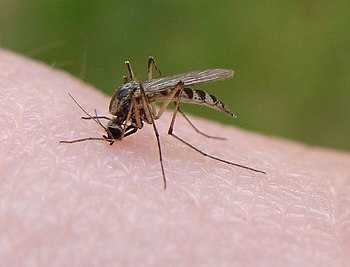 |
| English: A mosquito biting the photographer (Photo credit: Wikipedia) |
If you would like to read more of these interesting stories from the world of science, subscribe to our blog and we will send you an email every time we post something new and interesting. Alternatively, you can follow us on social media such as Facebook, Twitter or Google Plus!
References:
Fernández-Grandon, G., Gezan, S., Armour, J., Pickett, J., & Logan, J. (2015). Heritability of Attractiveness to Mosquitoes PLOS ONE, 10 (4) DOI: 10.1371/journal.pone.0122716
Ansell J, Hamilton KA, Pinder M, Walraven GE, & Lindsay SW (2002). Short-range attractiveness of pregnant women to Anopheles gambiae mosquitoes. Transactions of the Royal Society of Tropical Medicine and Hygiene, 96 (2), 113-6 PMID: 12055794
Lacroix R, Mukabana WR, Gouagna LC, & Koella JC (2005). Malaria infection increases attractiveness of humans to mosquitoes. PLoS biology, 3 (9) PMID: 16076240
Logan, J., Cook, J., Stanczyk, N., Weeks, E., Welham, S., & Mordue (Luntz), A. (2010). To bite or not to bite! A questionnaire-based survey assessing why some people are bitten more than others by midges BMC Public Health, 10 (1) DOI: 10.1186/1471-2458-10-275
Rajan TV, Hein M, Porte P, & Wikel S (2005). A double-blinded, placebo-controlled trial of garlic as a mosquito repellant: a preliminary study. Medical and veterinary entomology, 19 (1), 84-9 PMID: 15752181
Ives AR, Paskewitz SM, Inter-L&S 101, Biology Interest Groups, & Entomology Class 201 (2005). Testing vitamin B as a home remedy against mosquitoes. Journal of the American Mosquito Control Association, 21 (2), 213-7 PMID: 16033124
Lefèvre, T., Gouagna, L., Dabiré, K., Elguero, E., Fontenille, D., Renaud, F., Costantini, C., & Thomas, F. (2010). Beer Consumption Increases Human Attractiveness to Malaria Mosquitoes PLoS ONE, 5 (3) DOI: 10.1371/journal.pone.0009546






3 comments
This is a very interesting article. I would like to add a couple of points which seem to have missed. There is a long standing understanding that mosquito's have an odor preference. The Odor is based on the types of metabolic chemicals secrted in the skin wich are further acted upon by microbial content. Thus it makes sense to implicate skin microbiome as one of the contributors. Currently studies are underway to identify the key microbes. The idea is if you can establish a microbiome that isn't attractive (or even repellant) to mosquito that would solve a lot of the problem. But this approach is years away from practice. There is a second line of thought, which is more challenging. Does plasmodium somehow influence mosquito to have ferocious biting habbits (There are a couple of papers in case of dengue that it is possible, hence not a novel idea). Also does plasmodium infection in humans somehow influence metabolic state such that they are more attractive to mosquito, since that had be an advantage in transmission.
An important punchline. Easier than designing drugs that people have to take to generate a specific odor, the idea would be to have some sort of sprayable that will change the odor, for at least a lasting time. If this turns out to be the case, it is debatable as to how the mosquito will adapt, since the only way a mosquito will reproduce is they need a blood meal. There is going to be a evolutionary pressure to evolve.
Dear Varun,
Thank you for visiting our blog and sharing your thoughts with us.
We do agree with you that we left out the microbiome's role in body odour. There were two reasons for this. One being that microbiomes are a vast topic and it would end up making the post even longer :). The other is exactly what you have mentioned, treatment involving microbiome manipulation is many many years away. We are yet to understand the microbiome and we simply do not know how manipulating it could affect us.
The second point which you make about Plasmodium parasite being able to influence mosquito biting behaviour has been studied and is detailed in the paper by Lacroix et al 2003 (referenced above). Considering what we know about behaviour modification of organisms, (our post about Mind controlling parasites http://www.coffeetablescience.com/2012/11/mind-controlling-parasites.html), it would
not be surprising at all, that the parasite is even directing the mosquito to fly to well habited areas and seek out people with lower immunity.
Reg. your point about designing a repellant rather than a drug, we think other wise. The problem with repellants are that they either get washed off or run out of stock (true for remote areas). So, instead of having to ship bottles of repellant to remote locations and makng sure that everybody uses them, regularly, it would be better, if something like a camp could be organized and these drugs be administered and could last for six months or one year (like a nicotine patch or something) and keep mosquitoes at bay. Wouldn't you agree?
We would love to hear more from you on this. 🙂
Than you editor for clarification. I think that is a reasonably good argument.